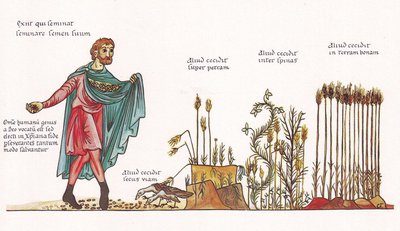Thoughts for the Day
Wednesday, 24th January 2024: Parables and their purpose
Teaching Parables Jesus Mark 4
Reading : Verses from Mark, Chapter 4

Again he began to teach beside the lake. Such a very large crowd gathered around him that he got into a boat on the lake and sat there, while the whole crowd was beside the lake on the land. He began to teach them many things in parables, and in his teaching he said to them: ‘Listen! A sower went out to sow. And as he sowed, some seed fell on the path, and the birds came and ate it up. Other seed fell on rocky ground, where it did not have much soil, and it sprang up quickly, since it had no depth of soil. And when the sun rose, it was scorched; and since it had no root, it withered away. Other seed fell among thorns, and the thorns grew up and choked it, and it yielded no grain. Other seed fell into good soil and brought forth grain, growing up and increasing and yielding thirty and sixty and a hundredfold.’ And he said, ‘Let anyone with ears to hear listen!’
When he was alone, those who were around him along with the twelve asked him about the parables. And he said to them, ‘To you has been given the secret of the kingdom of God, but for those outside, everything comes in parables; in order that “they may indeed look, but not perceive, and may indeed listen, but not understand; so that they may not turn again and be forgiven.”’
And he said to them, ‘Do you not understand this parable? Then how will you understand all the parables? The sower sows the word. These are the ones on the path where the word is sown: when they hear, Satan immediately comes and takes away the word that is sown in them. And these are the ones sown on rocky ground: when they hear the word, they immediately receive it with joy. But they have no root, and endure only for a while; then, when trouble or persecution arises on account of the word, immediately they fall away. And others are those sown among the thorns: these are the ones who hear the word, but the cares of the world, and the lure of wealth, and the desire for other things come in and choke the word, and it yields nothing. And these are the ones sown on the good soil: they hear the word and accept it and bear fruit, thirty and sixty and a hundredfold.’
(Lectionary, New Revised Standard Version)
Thoughts
What teacher today would say to their class: "I'm going to tell you a story, but you won't understand it."? Any sensible student would say to themself, "I shan't bother to attend then!" But this is what effectively Jesus does. Because of the crowds he is standing on a boat offshore. From here his voice would carry a mile or more (I know this from hearing fishermen way out on the Lake of Galilee, myself), but he warns that many people will not understand him. The disciples would probably accept this because the Book of Proverbs 26.7 says:
- 'Like the useless legs of one who is lame
is a proverb in the mouth of a fool.'
A parable is not a proverb. On one level it's a story taken from some incident in real life, but on another level it's a story with a deeper spiritual meaning. Like the proverb not all will get the meaning. Kenneth Bailey has put this in a rather lovely way. He says:
- "A parable is an extended metaphor and as such it is not a delivery system for an idea but a house in which the reader/listener is invited to take up residence.” ('Jesus through Middle Eastern Eyes')
Jesus spoke in parables as a way to separate those who truly believed that he was the Messiah, from those whose hearts were hardened with unbelief. But he was also using stories like 'The Parable of the Sower' to convict and condemn his listeners as well as to instruct and motivate those who followed him.
Prayer
Lord Jesus,
as You taught Your followers through
the use of story,
to look at everyday things in life,
to explain spiritual truths,
may we look again at Your parables
to discover the hidden and deeper meanings,
and apply them to our lives today.
Amen.
If you want to find out more about why Jesus used parables, this Bible Project is good, though it has a rather funny looking figure for Jesus at the beginning:
Or find out more about proverbs, also from the Bible Project - scroll down a page and press the start arrow to watch the video: